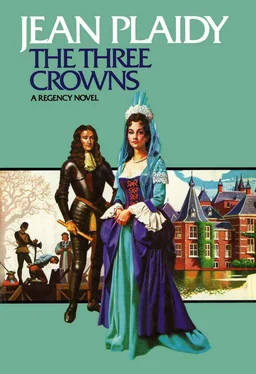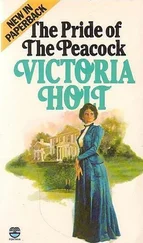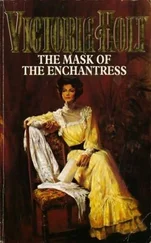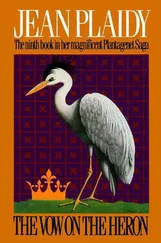Виктория Холт - The Three Crowns
Здесь есть возможность читать онлайн «Виктория Холт - The Three Crowns» весь текст электронной книги совершенно бесплатно (целиком полную версию без сокращений). В некоторых случаях можно слушать аудио, скачать через торрент в формате fb2 и присутствует краткое содержание. Жанр: Исторические любовные романы, на английском языке. Описание произведения, (предисловие) а так же отзывы посетителей доступны на портале библиотеки ЛибКат.
- Название:The Three Crowns
- Автор:
- Жанр:
- Год:неизвестен
- ISBN:нет данных
- Рейтинг книги:4 / 5. Голосов: 1
-
Избранное:Добавить в избранное
- Отзывы:
-
Ваша оценка:
- 80
- 1
- 2
- 3
- 4
- 5
The Three Crowns: краткое содержание, описание и аннотация
Предлагаем к чтению аннотацию, описание, краткое содержание или предисловие (зависит от того, что написал сам автор книги «The Three Crowns»). Если вы не нашли необходимую информацию о книге — напишите в комментариях, мы постараемся отыскать её.
The Three Crowns — читать онлайн бесплатно полную книгу (весь текст) целиком
Ниже представлен текст книги, разбитый по страницам. Система сохранения места последней прочитанной страницы, позволяет с удобством читать онлайн бесплатно книгу «The Three Crowns», без необходимости каждый раз заново искать на чём Вы остановились. Поставьте закладку, и сможете в любой момент перейти на страницу, на которой закончили чтение.
Интервал:
Закладка:
Jean Plaidy
The three crowns
THE BIRTH OF MARY
Throughout the day the sounds of rejoicing had echoed in St. James’s Palace. All the bells in London were ringing to welcome the new Queen; and by night the light from a hundred bonfires was reflected in the April sky.
The King continued to sup with Lady Castlemaine each night, a fact which made many shake their heads and ask themselves what wedded happiness there could be for the Princess from Portugal, in spite of the fact that her bridegroom was reckoned to be the most charming Prince in the world, having inherited the gaiety, wit, tolerance, kindliness and, alas, the sensuality of his grandfather, the great Henri Quatre of France, these many years since murdered by the knife of François Ravaillac.
The feastings, the ceremonies and pageants delighted the people of London—always ready to admire a King who had made England merry after years of puritan rule. They had jeered as the effigies of past heroes were hanged and insulted, while they cheered when the merry, ugly, fascinating King moved among them, with his band of hilarious-mannered, elegantly attired, rakish courtiers who attempted to become as notorious as Charles himself. And there were the ladies. Always the ladies! “Who will entertain him to supper tonight—and after?” asked his subjects indulgently. Stories of his escapades never failed to amuse. He was amorously insatiable, approachable, charming—all that a nation could ask of a King returned to his kingdom after being forced, by a dreary Parliament, to live in exile. And now there was a bride from Portugal.
At least one woman in St. James’s Palace was not concerned with the festivities. Anne Hyde paced up and down her apartment, her hands on her heavy body, and all her thoughts were for the child who would soon be born. She hoped fervently for a son—Anne Hyde’s son, who could, in time, be King of England. Not that it was likely, especially now that the King had a bride and several illegitimate children already to prove his virility. There was young Monmouth for one, a lusty fellow whom many—Charles included, so it was said—wished was legitimate. But Anne’s child would be in the line of succession, and until Charles and his bride produced a child, might be considered a possible heir to the throne.
She walked to a mirror which hung on the wall; it was so long that she could see her reflection from head to feet. She grimaced at the ungainly sight. She had never been a beauty at her best. All the more reason to be congratulated on having succeeded in making a marriage with James, Duke of York and brother to the King.
One of her women came into the apartment.
“Your Grace …” she began anxiously.
Anne shook her head. “Leave me. I will call you when I need you.”
“But …”
Anne waved her hand. “I shall know in good time. Everything is going as it should. I wish you could shut out some of the noise from the streets.”
“Ah, Your Grace, there is so much noise. The people are mad with excitement. The crowds in the Mall are so great that there is danger of being trodden underfoot. I saw His Majesty.” The woman smiled. “He bowed and smiled at me …”
Anne’s lips turned up at the corners sardonically. The King had a way of looking at a woman—any woman—and forever after that woman believed that he had been as excited by the encounter as she was. Charles was never too pressed to bestow those smiles on any female subject. He was a natural exuberant lover of women, and although James lacked that overwhelming charm, he was enough like his brother to make a wife watchful.
“I’ve no doubt he did,” answered Anne abruptly.
“And my lord Duke rode with him … a fine figure of a man, Your Grace. And getting more and more like His Majesty every day.”
“I trust not in every way,” retorted Anne.
“Oh, Your Grace!” The slight titter, the shine of the eyes, and the parted lips, meant that she was thinking of an occasional encounter with one of the royal brothers. Charles might have kissed her. Had James? “The Duke is such a devoted husband. As for His Majesty, his time has come. Although they say the Portuguese Princess …”
“Is not worthy of him?” interrupted Anne. “I’ll swear that’s what they say.”
“Doubtless she will look magnificent in her jewels, Your Grace, but who would not?”
Anne shrugged her shoulders. “I will call you when the pains begin in earnest.”
The woman bowed and retired. They were talking about Catherine of Braganza as once they had talked of Anne Hyde. So Catherine was plain. Strange that these two men—the King of England and his brother the Duke of York, both noted for their susceptibilities where women were concerned—should have plain wives. Not so strange that Charles should, for his was a marriage of diplomacy, uniting England with Portugal, and Catherine had brought a desirable dowry. But the Duke had married for love—secretly and in great haste—Anne Hyde, who had been at the time of the marriage so far gone in pregnancy that it had been necessary to hurry on the ceremony.
That had happened almost two years ago and the child who had made the hasty marriage necessary was now dead. But James did not regret his marriage, she was sure. His fidelity was doubtful but she, Anne Hyde, was certain that although he might find women at his brother’s Court more beautiful, he would never find one who meant to him what Anne Hyde did; not for any other would he have faced the wrath of his family as he had for her; and as long as she did not put too tight a rein on his extramarital adventures he was hers to command. She knew well enough that it was folly to expect fidelity from the grandsons of Henri Quatre.
Now, while he rode with his brother and acknowledged the cheers of the people—for his successes at sea had won him fame and popularity second only to that of the King—he would be thinking of her, praying for a boy as she was; anxiously thinking of her travail. He was as good a husband as she could hope him to be.
The pains were more definite now and she wondered whether to call her women, who were waiting with the midwife in the anteroom; this was rare privacy; and she owed it to what was happening outside; how many of those who must remain in the palace wished they were in the streets joining in the revels?
She began to think of her first encounter with James. He had been about twenty-two at the time, she about nineteen and in the service of James’s sister, the Princess of Orange. That had been before the Restoration when Charles and James had been two penniless princes wandering about Europe looking for friends who would help them regain their kingdom. James and his mother had arranged to meet the Princess of Orange in Paris and when she, Anne Hyde, had traveled there with the Princess from Breda, the Duke had noticed her. But he noticed all young women; and it was only later when he came to Breda to see his sister that the irresistible passion flared up between them.
“I’ll marry you,” James had said; and she had believed him, but she knew that the daughter of Edward Hyde, one of the King’s most trusted ministers, now Earl of Clarendon, was obviously no match for the heir presumptive to the British Crown; and when she had learned that soon there would be an end of Puritan rule in Britain, that royal Charles would be welcomed back as King and that James would go with him, her hopes of marriage were slight. She had believed then that a Princess would have been found for James and that his lightly given promise of marriage should be broken.
She shivered even now, remembering May 1660, the return of Charles to England, and herself ready to give birth in five months’ time! She believed she would love James to the end of her life for the attitude he took at that time. He declared he would brave his brother, her father, his formidable mother, and all the world for her sake and that of their child; and he had meant it. He had his small share of Stuart charm, and although he did not make promises as readily as his elder brother, he tried to keep those he made; and on a September night—six weeks before her son was born, Dr. Joseph Crowther had married them in her father’s house in the Strand.
Читать дальшеИнтервал:
Закладка:
Похожие книги на «The Three Crowns»
Представляем Вашему вниманию похожие книги на «The Three Crowns» списком для выбора. Мы отобрали схожую по названию и смыслу литературу в надежде предоставить читателям больше вариантов отыскать новые, интересные, ещё непрочитанные произведения.
Обсуждение, отзывы о книге «The Three Crowns» и просто собственные мнения читателей. Оставьте ваши комментарии, напишите, что Вы думаете о произведении, его смысле или главных героях. Укажите что конкретно понравилось, а что нет, и почему Вы так считаете.








